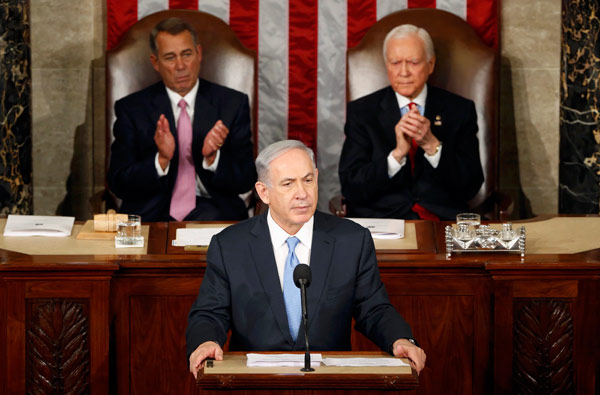 |
|
Israeli Prime Minister Benjamin Netanyahu (C) addresses a joint meeting of Congress in the House Chamber on Capitol Hill in Washington, March 3, 2015. US Speaker of the House John Boehner (L) (R-OH) and President pro tempore of the US Senate Orrin Hatch (R-UT) applaud Netanyahu. [Photo/Agencies] |
Israeli Prime Minister Benjamin Netanyahu told the US Congress on Tuesday that an emerging agreement between Iran and the United States would all but guarantee that Tehran gets nuclear weapons and would be a very bad deal, drawing an extraordinarily blunt rebuttal from President Barack Obama.
Netanyahu said "Iran has proven time and again that it cannot be trusted," no matter what it says about permitting verification of the terms of any accord designed to prevent it from getting a nuclear bomb.
"The greatest danger facing our world is the marriage of militant Islam with nuclear weapons," he said in remarks before a packed House chamber that drew loud applause from Republicans and a more restrained reaction from Democrats in an appearance that has stirred political controversy in two countries..
Obama saw it differently, and said so from the White House. He said that the Israeli leader offered no "viable alternatives" to the nuclear negotiations with Iran and that the prospect of an agreement had already resulted in a freeze and rolling back of Iran's program.
Netanyahu spoke in English shortly after Secretary of State John Kerry met for more than two hours in Switzerland with Iranian Foreign Minister Mohammad Javad Zarif in hopes of completing an international framework agreement later this month to curb Tehran's nuclear ambitions.
The Israeli leader's appeal also came two weeks before tight elections in which he is seeking a new term and after the invitation to address Congress extended by House Speaker John Boehner, a Republican, triggered a political furor in the United States because he did not consult the White House or Democratic leaders in the House and Senate.
More than four dozen House and Senate Democrats said in advance they would not attend the event, a highly unusual move given historically close ties between the two allies.
Many of Netanyahu's comments were greeted by loud applause from US lawmakers, but not everyone was persuaded by his rhetoric.
House Democratic Leader Nancy Pelosi conspicuously refrained from applauding on several occasions, and when the Israeli leader called for holding out for a better deal with Iran, she held her hands wide and shook her head in disagreement.
The White House expressed its displeasure with Netanyahu's appearance by word and deed, dispatching Vice President Joe Biden on an overseas trip that meant he did not fill his customary seat behind the House rostrum during the speech. Nor did the Israeli leader meet at the White House with Obama on his trip to the United States.
The prime minister was greeted with a roaring welcome as he walked down the same center aisle of the House chamber that presidents tread before their annual State of the Union speeches.
He also sought to smooth over any political unpleasantness, thanking Obama lavishly for the help he has given Israel since he became president.
At the same time, Netanyahu was unrelenting in his condemnation of the negotiations the administration is conducting with Tehran.
He said that with the concessions the United States was prepared to make Iran would not only gain nuclear weapons, but also eventually would become free of international economic sanctions. As a result, he said, it would be emboldened to finance even more terrorism around the Middle East and the world.
The result for Iran, he said, would be "aggression abroad and prosperity at home."
Instead, he said that if Iran wants to be "treated like a normal country, it ought to behave like a normal country."
"We've been told that no deal is better than a bad deal. Well this is a bad deal, a very bad deal," he said.
He said that the world needs to insist that no restrictions are lifted on Iran's nuclear program until the country stops aggressive actions against its neighbors in the Mideast, stops supporting terrorism around the world and stops threatening to annihilate Israel.
Later, at the White House, Obama took issue with Netanyahu's comments as well as the invitation that led to his speech.
"On the core issue, which is how do we prevent Iran from obtaining a nuclear weapon, which would make it far more dangerous and would give it scope for even greater action in the region, the prime minister didn't offer any viable alternatives," he said.
Asked before a meeting with Defense Secretary Ash Carter about Netanyahu speaking before Congress, Obama said the US has a system of government where "foreign policy runs through the executive branch and the president, not through other channels."